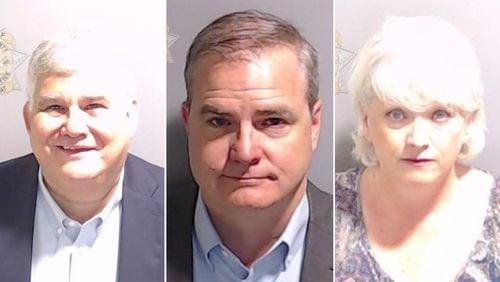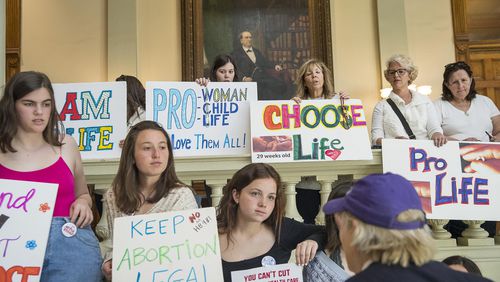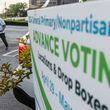Three Republicans who cast Electoral College votes for Donald Trump after the 2020 presidential election were acting as federal officers and doing what the law allowed, defense lawyers told a federal judge on Wednesday.
The Trump electors — former Georgia GOP Chairman David Shafer, state Sen. Shawn Still and former Coffee County GOP Chairwoman Cathy Latham — are charged in Fulton County with conspiring to overturn the 2020 presidential election. They are seeking to get their cases removed from Fulton Superior Court to U.S. District Court in Atlanta.
“They thought they had done what they were supposed to do,” said Still’s attorney, Tom Bever, describing the Dec. 14, 2020, electoral vote at the state Capitol. “They never dreamed they had done something wrong, never dreamed they had done something criminal.”
Special prosecutor Anna Cross called the defense’s contentions “untethered to any factual legal evidence.” She urged U.S. District Judge Steve Jones to keep the case in Fulton County.
At the close of an almost three-hour hearing, Jones said he would issue an order as soon as possible. Shafer, Still and Latham did not attend the hearing.
Attorneys for the defendants argued their clients were “contingent” electors under the federal Electoral Count Act. Among other things, the law requires states to resolve legal disputes about the outcome of elections six days before presidential electors cast their ballots — the so-called “safe harbor” deadline.
When presidential electors met on Dec. 14, 2020, Trump’s lawsuit challenging the election in Georgia was still pending. That meant Gov. Brian Kemp’s certification of Democrat Joe Biden was no longer valid, argued Shafer’s attorney, Craig Gillen.
Because of that, neither the Democratic nor Republican electors were official, Gillen said. At that point, it was up to Congress to pick the proper electors. If both houses of Congress agreed on the winner, that was the official slate, he said. If the houses couldn’t agree, then – and only then – would Kemp’s certified slate become official.
Gillen argued that made the 16 Republicans “contingent” electors under federal law.
“They weren’t ‘fake.’ They weren’t ‘shams.’ They weren’t ‘impersonators,’” Gillen asserted, referring to terms used by prosecutors and the news media. “They were contingent electors.”
Cross called Gillen’s arguments “novel,” “nonsense” and “fantasy.” She noted that, after correcting deficiencies, Trump refiled his lawsuit the day before the safe harbor deadline. Under the electors’ argument, that gave the court one day to resolve the dispute.
Cross said the electors had presented no case law supporting the idea “that you can file a procedurally and substantively deficient challenge and, suddenly, everything’s up in the air.” She said the Republicans did not become federal officers simply by claiming to be official presidential electors.
“They were fake electors,” Cross said. “They were impersonating electors. They were not electors at all.”
The defendants claim they were “contingent’ electors acting in an official federal capacity and that entitled them to have their cases transferred to federal court, where they could be judged by jurors from across the metro region, which is more politically conservative than solidly Democratic Fulton County.
During his argument, Gillen said, there are people who like Trump and people who hate the former president and those who dislike Trump have slanted their views against the GOP electors.
Gillen cautioned that the case is not a referendum on the former president.
“This hearing is not about Donald Trump. This hearing is about three citizens of Georgia,” he said.
Gillen suggested active Trump supporters like the GOP electors could be “in the danger zone” for possible prosecution. Cross rejected that argument, calling it “borderline offensive,” She said the same charges would have been filed against Democrats or Libertarians if they had acted as the Republican electors did.
“This is not the big bad state of Georgia going after Trump supporters,” she said.
The arguments were the latest development in a racketeering case alleging Trump and his allies violated the law when they tried to overturn Biden’s victory in Georgia. Fulton County District Attorney Fani Willis charged 19 people — including Trump ― in what she calls a “criminal enterprise.”
Jones has already rejected a federal removal request from another defendant - former White House Chief of Staff Mark Meadows. That decision is under appeal.
Former Justice Department official Jeffrey Clark also made his case for removal before Jones on Monday. A decision is pending.
To have their cases transferred to federal court, the Republicans must show they were federal officers performing federal duties. They also must raise a plausible federal defense.
At one point in the hearing, Jones asked Hollie Pierson, another lawyer representing Shafer, why he should disregard two U.S. Supreme Court decisions that said Electoral College electors are not federal officials.
Pierson told Jones that the high court’s references to the electors was “dicta,” meaning the passage was an opinion of a court but not binding in subsequent cases as legal precedent.
Jones agreed but then said, “There’s dicta, then there’s Supreme Court dicta.”








